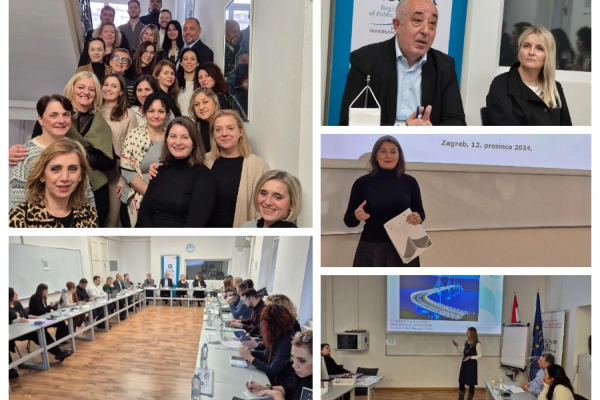
ReSPA Advances EU Accession Through Expertise and Cooperation
10-12 December 2024, Zagreb, Croatia
With support from the National School of Public Administration, ReSPA hosted an intensive three-day training focused on "Cluster 4: Green Agenda and Sustainable Connectivity" as part of the ongoing negotiation modules for EU accession. Aimed to equip civil servants from the Western Balkans with advanced knowledge and tools to navigate the complex requirements of EU integration in areas such as transport policy, the environment, energy, trans-European networks, and climate change, reflecting the EU's commitment to advancing sustainable development and regional connectivity.
Through a blend of expert-led technical sessions and opportunities for networking and peer exchange, participants gained practical insights into transposing the EU acquis and advancing reforms in key sectors.
Distinguished experts and senior representatives from various institutions will lead discussions, including Goran Temovski, Transport Acquis and Legal Desk Officer at the Transport Community, who addressed EU transport policy and its implications for the Western Balkans including the TEN-T network status and progress; Peter Vajda, Senior Environmental Expert from the Energy Community, who provide insights into energy policy and its links to environmental and climate priorities, while Jochen Penker, Chief Technical Advisor at UNOPS, focused on challenges in the energy sector within the EU integration context. Aleksandar Andrija Pejovic offered an overview of Cluster 4 progress in each administration focusing on priorities and the importance of sharing the experience of those who advanced more in the process with their colleagues whose administrations are in the initial stages of EU accession talks. Chrysoula Argyriou, Policy Officer for Renewable Energy and Energy System Integration at DG NEAR, contributed with expertise on the renewable energy directive and its goals and targets, Višnja Grgasović, from the Ministry of Environmental Protection and Green Transition of Croatia, addressed climate change goals and diversifying energy sources, while the representatives from the Croatian Energy Regulatory Agency, including Hrvoje Miličić and Tomislav Strahovnik, Davorin Brkić and Sonja Tomašić Skevin, explored the requirements of the internal energy market and infrastructure and supply and consumers in the electricity and gas sector. Tanja Šinko and Darinka Lezaić from Croatia’s Ministry of Environmental Protection and Green Transition provided an overview of the state of play concerning strategic environmental assessment and environmental impact assessment, and Draga Mihelić presented on the environment permits about industrial pollution. Ivana Jelenić offered an overview of the Croatian experience in negotiations in nature protection, including technical adaptations of Habitat and Birds Directives and general information on post-accession obligations. Finally, Josipa Božinović from the Ministry of the Sea, Transport and Infrastructure presented a comprehensive experience of Croatia’s EU accession talks in Chapters 14 and 21, followed by her colleagues Maša Viduka and Darjan Konjić who presented the Fourth Railway Package and its market and technical pillars. The program was concluded by an interactive presentation on EU funds available pre and post-accession dedicated to the development of major network infrastructure delivered by Tamara Lachowski, an attorney specialising in state aid and Martina Skvorc, an EU funds expert from the Ministry of the Sea, Transport and Infrastructure.
Jelisaveta Tasev, ReSPA Programme Manager, underlined that this event is a unique opportunity to bring together the civil servants working in the transport, energy and environment sectors to allow them to understand better each other’s roles in negotiating Cluster 4. In addition, the participants interacted and learned from the representatives of international organisations, their counterparts from the Croatian civil servants, and experts coming from the private sector working in close cooperation with the government structures. This truly intense training created a platform for further cooperation, regional exchange and closer integration with the EU and its Member States. ReSPA successfully organised the second Training Module on Negotiation Clusters as part of a series of such modules dedicated to each cluster, which started in 2024 and will be completed in 2025. This gave us a unique opportunity to distribute important key messages to help build capacity in many public administration organisations and assist them in their efforts toward market integration, legislative alignment and reform.
As negotiations intensify, the training represents a pivotal step toward empowering public administrations in the region to navigate the EU accession process while promoting sustainable growth and resilience. This event underscores the EU's dedication to fostering sustainable growth and regional cooperation while empowering Western Balkans public administrations to progress in their accession journey.



